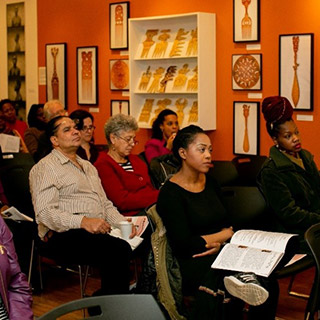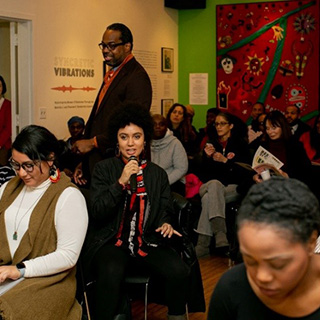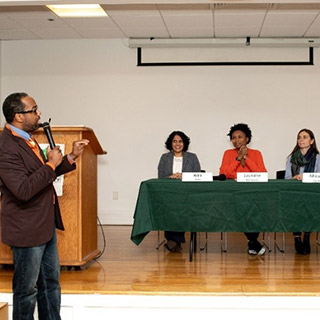April 12, 2019
Nearly 50 community members met with staff from Columbia University and WE ACT for Environmental Justice to learn about possible health risks from harmful chemicals found in cosmetics and personal care products. The free two-hour event, “Beauty Inside Out,” was jointly hosted by Columbia University’s Center for Environmental Health in Northern Manhattan (CEHNM), the Columbia Center for Children’s Environmental Health (CCEH), and WE ACT.

The diverse audience listened to several presentations and received handout materials to reinforce what they learned.
(Photo courtesy of WE ACT)
The goal of the meeting was to bring community members and researchers together to discuss the impacts that common beauty and personal care products may have on women’s health. Chemicals of concern from these types of products include mercury, lead, parabens, phthalates, and hormone disruptors.

Audience members were actively engaged and asked pointed questions that fostered discussion and enhanced learning.
(Photo courtesy of WE ACT)
Presenters highlighted that women of color may be disproportionately exposed to toxic chemicals in beauty products. For example, women of color are more likely than white women to use skin lightening creams, which may contain mercury, and hair relaxers, which contain parabens and other hormone disrupting chemicals.
Drawing a diverse audience ranging in age from approximately 20-70 years old, attendees included women from the local community in Harlem, community activists, representatives from non-profit organizations, and Columbia CEHNM and CCEH researchers.
Presenters discussed the safety of using products during sensitive windows of development, like pregnancy and puberty, and possible metals and toxins that may be present in both regulated and unregulated products. They recommended phone applications (apps), such as the Detox Me app created by Silent Spring Institute, and provided information handouts to help community members reduce their exposure. For example, women and men can avoid some hair dye chemicals by using natural henna to color their hair. They can also buy organic beauty products that often have natural ingredients.
After learning of ways to reduce exposure, one audience member commented, “What I've done is say okay, either A) I'm going to splurge on an organic product for a particular item because I know I use it a lot and I'm going to be highly exposed, or B) I'm going to look at YouTube to find a do-it-yourself [option]."

WE ACT Deputy Director and Director of Policy Initiatives Cecil Corbin-Mark (left) moderated a panel discussion and question answer session. Panelists included (seated, left to right) Zota, McDonald, Spratlen, and Hore.
(Photo courtesy of WE ACT)
The highly involved audience asked pointed questions during discussion times, often about action steps. One participant asked, "What do we do when alternative toxic-free products are expensive? How do we make sure that as we transition into a toxic-free method we are not leaving people of color and low-income behind?"
Possible action steps by local government were also discussed, and one participant asked, “What can New York City do or not do in terms of managing our [use] of the ingredients like phthalates, parabens, and other chemicals we learned about today?”
Presenters included Peggy Shepard, executive director of WE ACT; Diana Hernandez, Ph.D., director of the CEHNM Community Engagement Core; and Frederica Perera, Ph.D., Dr.P.H., director of the Columbia CCEH, who welcomed the attendees. Guest speakers included Ami Zota, Sc.D., a research scientist at the George Washington University School of Public Health; and Paromita Hore, Ph.D., from the New York City Department of Health and Mental Hygiene. Two researchers from the Columbia Mailman School of Public Health – Jasmine McDonald, Ph.D., and Miranda Spratlen, Ph.D., – also spoke at the event.
The event was held on January 16, 2019, at the Schomburg Center for Research in Black Culture, a local venue in the heart of Harlem. WE ACT streamed the event live on Facebook, and a video of the full event as well as speaker presentations, are available on the WE ACT event webpage.


